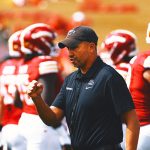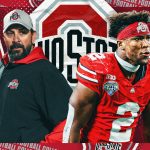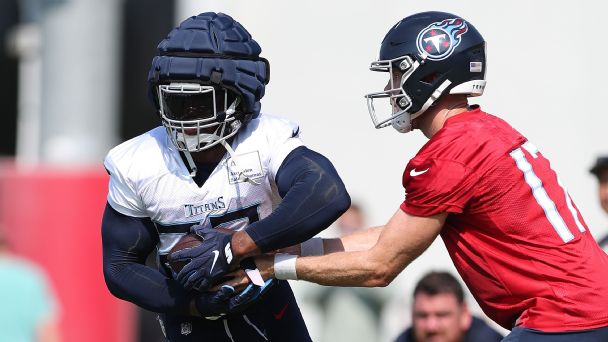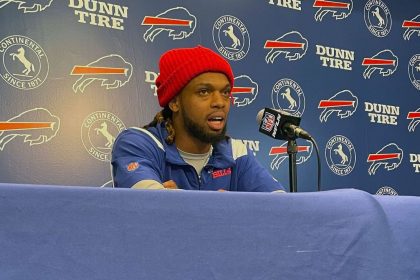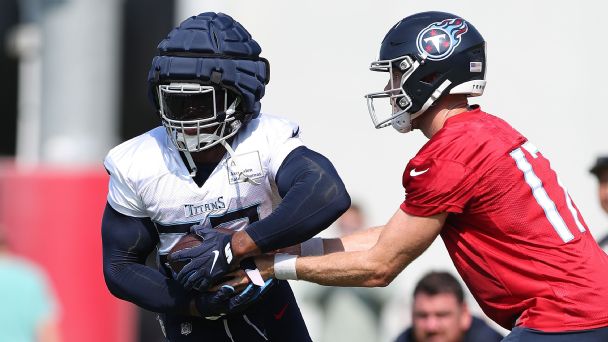
NASHVILLE, Tenn. — Most of the buzz at Tennessee Titans training camp has revolved around newly signed wide receiver DeAndre Hopkins, as new offensive coordinator Tim Kelly and veteran quarterback Ryan Tannehill have made an effort to get Hopkins heavily involved.
While Kelly is happy to be reunited with Hopkins after serving as his offensive coordinator in 2019 with the Houston Texans, he isn’t losing sight of who the Titans’ offense revolves around — specifically, Derrick Henry and the run game.
“It would be foolish of me to not play to our strengths,” Kelly said. “Having Derrick here, we gotta make sure we’re putting him in the best spot to continue to have the high level of success he’s had throughout his career.”
Since Mike Vrabel became Tennessee’s coach in 2018, Henry led the NFL in rushing twice including a 2,025 rushing yard performance in 2020.
Henry led the NFL with 937 rushing yards through eight games in 2021 before he suffered a broken foot, and despite missing the final nine games that season, Henry’s rushing total was still ninth best. Last season, Henry finished second in rushing with 1,538 yards — while missing one game.
Over those three years, Henry has rushed for 4,502 yards, averaging 112.55 yards per game. If he’s anywhere near that pace, he can eclipse 10,000 rushing yards for his career, as he’s 1,665 yards shy.
“One of our better players is Derrick as our running back,” Vrabel said. “That would be how you would try to formulate a game plan is to get your best players the ball.”
Vrabel views the rushing attack as an opportunity to establish an identity and take a toll on defenses.
The Titans have had the most rushing attempts (2020 and 2021) in the league in two of Vrabel’s five seasons as the coach. When asked about sticking to Vrabel’s plan, Kelly vowed to not forget the Titans’ identity and continue to utilize the run game as the backbone of the offense.
New running backs coach Justin Otten said the dedication to the run game is one of the main reasons he wanted to join the Titans staff. Otten was the Denver Broncos‘ offensive coordinator last season.
Otten’s experience calling plays helped create his belief that the run game takes the pressure off the quarterback and helps the offensive line avoid always having to drop back in pass protection. He also believes that running the ball opens up other parts of the offense.
“You have to run the ball to set up the pass,” Otten said. “Get those guys to come downhill, then they have the late reaction, get in freak-out mode and suddenly backpedal.”
Offensive lineman Daniel Brunskill has seen it firsthand from his days with the San Francisco 49ers. Brunskill said he notices how defenses “panic” and overcompensate when the run game starts hitting.
“A token run fake opens up an offense to a plethora of plays to go to,” Brunskill said.
It’s no coincidence that Tannehill leads the league in QBR (79) and yards per attempt (10.5) since joining the Titans in 2019 on play-action passes, according to ESPN Stats & Information, and he is third in first-down percentage (46%).
“You want to compliment what we’ve done well and take advantage of holes that it creates,” Tannehill said.
With Kelly calling the plays and a viable set of weapons for Tannehill that features Hopkins along with second-year playmakers Treylon Burks and Chigoziem Okonkwo, the Titans figure to get more dynamic on offense.
Adding a playmaker like Hopkins gives the Titans a chance to chase the offensive success they had in 2020 when they averaged 29.6 points per game, fourth-best that year. The balanced offense that season had a 1,000-yard receiver in A.J. Brown to compliment Henry’s 2,025 rushing yards. Corey Davis had 984 receiving yards, as well, which fell 16 yards short of joining the 1997 Detroit Lions and 1998 Broncos as the only teams to feature two 1,000-yard receivers and a 2,000-yard rusher.
The Titans finished outside of the top five in rushing attempts, yards and touchdowns twice (2018, 2022) under Vrabel. Both of those seasons were the only two without Brown, who eclipsed 1,000 yards in two of his three seasons in Tennessee. Without the threat of Brown, teams were able to stack the box to stop the run and not worry about a receiver on the outside making them pay. Hopkins, a five-time Pro Bowler, changes that.
But it all starts with Henry. In what may be his final season with the Titans due to his expiring contract, Henry welcomes another chance to be the focal point of the offense.
“I embrace it all,” Henry said. “Pressure makes diamonds, so I ain’t tripping at all.”

